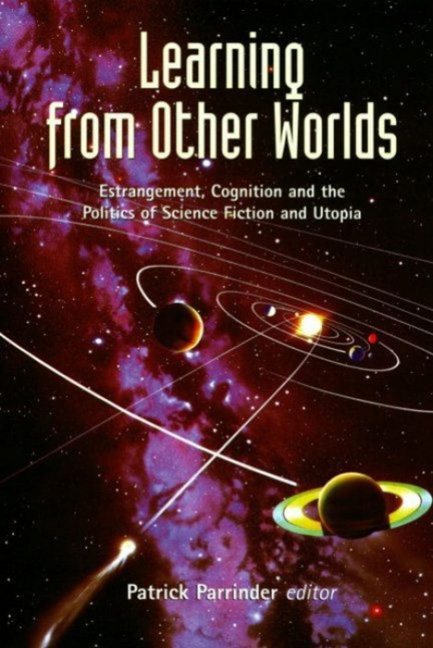Book contents
- Frontmatter
- Contents
- Acknowledgements
- Contributors
- Introduction: Learning from Other Worlds
- Part I Science Fiction and Utopia: Theory and Politics
- Part II Science Fiction in its Social, Cultural and Philosophical Contexts
- From the Images of Science to Science Fiction
- Estranged Invaders: The War of the Worlds
- ‘A part of the … family [?]’: John Wyndham's The Midwich Cuckoos as Estranged Autobiography
- Labyrinth, Double and Mask in the Science Fiction of Stanislaw Lem
- ‘We're at the start of a new ball game and that's why we're all real nervous’: Or, Cloning—Technological Cognition Reflects Estrangement from Women
- ‘If I find one good city I will spare the man’: Realism and Utopia in Kim Stanley Robinson's Mars Trilogy
- Afterword: With Sober, Estranged Eyes
- Darko Suvin: Checklist of Printed Items that Concern Science Fiction (with Utopian Fiction or Utopianism, and a Few Bordering Items)
- Bibliography
- Index
From the Images of Science to Science Fiction
from Part II - Science Fiction in its Social, Cultural and Philosophical Contexts
- Frontmatter
- Contents
- Acknowledgements
- Contributors
- Introduction: Learning from Other Worlds
- Part I Science Fiction and Utopia: Theory and Politics
- Part II Science Fiction in its Social, Cultural and Philosophical Contexts
- From the Images of Science to Science Fiction
- Estranged Invaders: The War of the Worlds
- ‘A part of the … family [?]’: John Wyndham's The Midwich Cuckoos as Estranged Autobiography
- Labyrinth, Double and Mask in the Science Fiction of Stanislaw Lem
- ‘We're at the start of a new ball game and that's why we're all real nervous’: Or, Cloning—Technological Cognition Reflects Estrangement from Women
- ‘If I find one good city I will spare the man’: Realism and Utopia in Kim Stanley Robinson's Mars Trilogy
- Afterword: With Sober, Estranged Eyes
- Darko Suvin: Checklist of Printed Items that Concern Science Fiction (with Utopian Fiction or Utopianism, and a Few Bordering Items)
- Bibliography
- Index
Summary
The question of the relationship between science and science fiction has stayed relatively obscure despite the numerous works of critics and theoreticians interested in the genre. Many of them consider SF as a more or less parasitic literary extension of science, in the mode of speculation and extrapolation, audacious, perhaps irresponsible, often inexact, sometimes ignorant. Thus science fiction would boldly express what science does not yet dare to affirm or suggest, and even what it would find absurd. It would develop the social, ethical, metaphysical or purely logical consequences of science, or set out to confirm its ideological assumptions. In such a perspective, the literature of science fiction would be a continuation, albeit purely verbal and conceptual, imaginary and anticipative, of the real scientific work that itself sometimes uses fictions in the form of so-called ‘thought experiments’.
Such an approach proceeding directly from the difficulty of adequately defining science fiction seems to me to open up a number of problems that the theoreticians have neglected or have been unable to solve. Much of science fiction has—to say the least—a very tenuous relationship with science, but it is impossible to exclude it from the corpus, as perceived by the majority of its readers and by the historians of the field. It is even very easy to find deliberately anti-scientific works of science fiction. Should one reallocate these to another, highly problematic genre or field?
I have given some thought to that difficult question for more than forty years as writer, editor and critic, and I feel I have reached a hypothesis which, though provisional, has the merit of suggesting solutions to some of these problems, and, moreover, of throwing some light on the genesis of ideological productions irrelevant to science fiction but having problematic relationships with science.
(It must be understood that in what follows the word ‘science’ is a convenient shorthand for the full range of science and technology, and that this term does not in any way imply the unity or metaphysical identity of the fields concerned.)
The Images of Science
My feeling is that science fiction does not proceed directly from science, nor from philosophy, but that the sciences (and, for that matter, philosophy) produce, often unknowingly, images (eikons) and representations (eidons). A good example of a scientific image (eikon) is that of Jupiter surrounded by some of its satellites in Galileo's telescope.
- Type
- Chapter
- Information
- Learning from Other WorldsEstrangement, Cognition, and the Politics of Science Fiction and Utopia, pp. 119 - 126Publisher: Liverpool University PressPrint publication year: 2000

